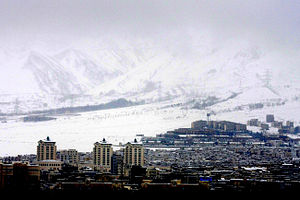 Image by Getty Images via Daylife
Image by Getty Images via Daylife(ANSAmed) - ANKARA - The vote of the Foreign Affairs Committee of the US House of Representatives on a non-binding resolution in which the 1915 and 1917 Armenian massacres that took place during the Ottoman empire are defined as ''genocide'' was expected in Ankara. So much so that, with unusual speed in Turkey, as soon as it was discovered from the website of the Turkish Cabinet Office that out of the 46 members of the Committee, 23 against 22 voted in favour of the document, a message of condemnation immediately appeared. Premier Tayyip Erdogan expressed concern over the consequences of the vote and underlined that the taking of a stance by the parliamentary body ''risks damaging Turkish-American relations, as well as the process of normalisation between Turkey and Armenia.'' Shortly after, it was announced that the Turkish Ambassador to the US, Namik Tan, has been immediately recalled to Ankara ''for consultation''. Tan arrived in Washington just a few weeks but is already an expert on America. That things were not looking good for Ankara was already clear a few days ago, but events have taken a turn for the worse in the last 48 hours. Turkey was opposed to the approval of the document insomuch as it has always denied that the number of Armenians killed during the massacres total one and a half million (for Ankara there were ''only'' 300,000) and that they died as a result of a civil war and not due to genocide. Thus yesterday morning Turkey had already raised not only the possibility of withdrawing their Ambassador if the resolution were approved, but also the potential of cancelling contracts worth 45 billion dollars with five large US defence companies. Furthermore, Ankara has circulated - via the Turkish press - a so-called 'Plan B' to be implemented if the document is approved. This plan sets out, amongst other things, that Turkey could potentially not ratify the protocols of normalisation of relations signed in October in Zurich with Armenia, considered to be important for the stability of the Caucasus.
source-http://www.ansamed.info
![Reblog this post [with Zemanta]](http://img.zemanta.com/reblog_e.png?x-id=266df5c4-b331-444b-b038-794d43936f41)

![Reblog this post [with Zemanta]](http://img.zemanta.com/reblog_e.png?x-id=dacb030a-d792-4b48-8ded-7ddd89e61bcc)
![Reblog this post [with Zemanta]](http://img.zemanta.com/reblog_e.png?x-id=fb6ede79-ec9b-455d-be5d-48360013b790)

![Reblog this post [with Zemanta]](http://img.zemanta.com/reblog_e.png?x-id=8c957af9-42fd-4dcb-80a0-fce5341ff25b)

![Reblog this post [with Zemanta]](http://img.zemanta.com/reblog_e.png?x-id=f6dae11e-91e5-4b5b-b7aa-4f40cd5b61db)

![Reblog this post [with Zemanta]](http://img.zemanta.com/reblog_e.png?x-id=d35794fc-90b1-4b37-8d9f-6ebb60b83982)

![Reblog this post [with Zemanta]](http://img.zemanta.com/reblog_e.png?x-id=1b98dc41-91ec-4751-9b99-7e3ef8949314)